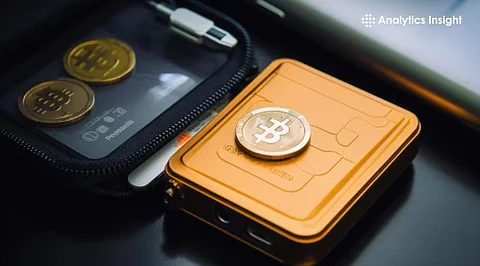

Hardware wallets provide unmatched offline protection, keeping crypto safe from online threats like hacking and malware in 2025's high-risk digital environment.
Self-custody empowers true ownership, removing reliance on centralized exchanges that are prone to hacks and shutdowns.
Growing adoption and innovation are making hardware wallets more user-friendly and versatile, becoming essential for securing digital identities, assets, and Web3 access.
In the constantly evolving world of digital finance, 2025 is an essential year for the security of cryptocurrencies. Digital assets are now becoming more accepted by the general public, and the critical need to secure them is ever more pressing. Among the spectrum of security measures available for securing crypto, hardware wallets are essentially portals of security for one's crypto holdings.
While software wallets sit on the Internet, hardware wallets offer an offline alternative to keep private keys safe from online threats. Even if, for some dreadful circumstance, the victimizing type of malware corrupts the personal computer or smartphone, the hardware wallet secures the private keys along with the associated digital assets.
Hardware wallets, often called cold wallets, store private keys in a secure, offline environment. This isolation from the internet makes them impervious to common cyber threats such as hacking, phishing, and malware attacks. Hardware wallets provide a robust defense against unauthorized access by keeping the keys offline.
Devices like the Ledger Nano X and Trezor Safe 5 are the perfect distillation of this paradigm of keeping the keys offline and requiring physical confirmation for transaction execution. This way, even if an attacker manages to breach a user's computer, they cannot transfer any funds without the physical wallet in hand.
The principle of self-custody is central to the ethos of cryptocurrency. Once a person holds the keys, that person has an asset in full ownership and does not have to rely on any third-party custodian for safekeeping. This freedom is essential, especially when a few centralized exchanges faced hacks or insolvencies, resulting in huge losses for users.
Hardware wallets, in a way, foster this principle. A hardware wallet stores the private keys in an offline setting and permits transactions only after a physical presence, which may come in the form of a button press or entering a PIN; hence, it assures that only the rightful owner can access the assets and transfer them.
Centralized exchanges, while convenient, present inherent risks. They are attractive targets for hackers and susceptible to regulatory actions that can freeze or seize assets. The 2024 WazirX hack, in which attackers exploited vulnerabilities to drain funds, underscores the dangers of entrusting assets to centralized platforms.
By contrast, hardware wallets do not require users to store assets on exchanges. Users can transact directly from their wallets, maintaining control and reducing exposure to exchange-related vulnerabilities.
Modern hardware wallets come equipped with features designed to enhance security further. Multi-factor authentication, PIN codes, and recovery seed phrases are standard, ensuring that assets remain protected even if a device is lost or stolen. Some wallets, like the ELLIPAL Titan 2.0, offer air-gapped security, operating without any network connections to eliminate remote attack vectors.
Additionally, many hardware wallets support a wide range of cryptocurrencies, including Bitcoin, Ethereum, and various altcoins, making them versatile tools for diverse portfolios.
The rise in physical attacks targeting crypto holders, such as the kidnapping of Ledger's co-founder in France, highlights the need for robust security measures. By requiring physical interaction and authentication, hardware wallets provide a deterrent against such threats. Accessing the assets remains challenging even if a device is obtained through coercion, without the necessary PIN or passphrase.
As the cryptocurrency world matures, the importance of securing digital assets cannot be overstated. Hardware wallets offer a compelling solution, combining offline storage, self-custody, and advanced security features to protect against both digital and physical threats.
In 2025, hardware wallets will be not only recommended but essential for anyone serious about safeguarding their crypto investments.
The year 2025 has seen a notable increase in demand for hardware wallets. With rising regulatory pressure and high-profile exchange failures, more users prioritize self-custody over convenience. Hardware wallets have become a go-to solution for experienced investors and crypto newcomers who want control over their assets without compromising safety.
Influencers, financial educators, and cybersecurity experts also support this growing interest. They strongly recommend using cold wallets as part of a balanced crypto security strategy. As a result, manufacturers are scaling up production and introducing user-friendly interfaces to serve a broader audience.
As more people enter the crypto world, education around secure storage has become just as important as investment advice. Platforms, creators, and community groups are emphasizing teaching the benefits of hardware wallets early in a user’s crypto journey. Tutorials, YouTube reviews, and webinars are helping break down the process of setting up and using a cold wallet, removing the fear or confusion that once kept beginners away.
By simplifying the language and walking users through real-world use cases, the crypto community is making it easier than ever for anyone to understand and adopt safer storage practices.
Looking ahead, hardware wallets are expected to evolve with the industry. Innovations like biometric authentication, Bluetooth support, and integrations with decentralized applications (dApps) make these devices even more powerful. Companies are also working on seamless recovery methods and cross-chain compatibility, allowing users to manage all their assets securely in one place.
As Web3 grows and digital identities become more important, hardware wallets might not just protect coins—they could also secure login credentials, NFTs, and even personal data. This positions them as critical tools not just for security but also for participation in the future of the Internet.
